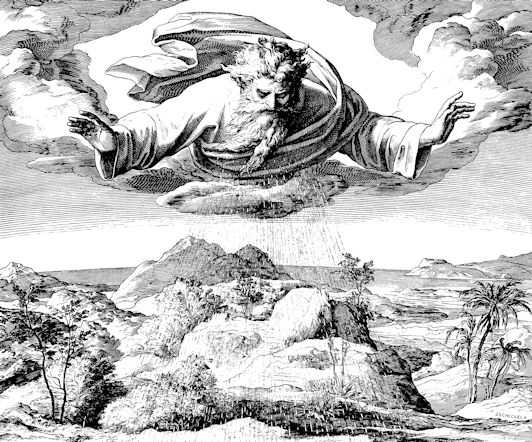
More classic art masterpieces used as illustrations
TL;DR: -- Genesis 1:1 isn’t just a creation story. It's the foundation of the misio dei, God's global mission to reach all nations. The Church’s call to evangelism originates from the Bible’s first verse. The page includes an acrostic poem on MISSIO DEI as well as noteworthy quotes from other authors about the relevance of Genesis 1 to world missions.

"In the beginning God created the heavens and the earth" -- Genesis 1:1
"God had a mission strategy from the very beginning. God wanted to have a holy, loving relationship with all people." -- Randy Seedorf, worship and discipleship pastor
Rarely do people see Genesis 1:1 as saying something important about world evangelism. That is an oversight because a strong case for cross-cultural missionary outreach can be built on Genesis 1:1. Revelation 4:11 explains why: "You are worthy, our Lord and God, to receive glory and honor and power, for you created all things, and by your will, they were created and have their being."
The majestic phrasing of Genesis 1:1 about God as our Creator should push us away from the live-and-let-live argument of relativism. That philosophy says, "Why bother other people? They have their religion; we have ours."
Such attitudes run counter to the meaning of the Bible's opening verse. Because Yahweh created the universe, including the human race, doesn't He have exclusive rights to reign over all human beings -- even those who know little or nothing of Him? Paul tried to make this clear to the people in Lystra, who regarded him and Barnabas as gods after a healing miracle. Alluding to Genesis 1:1, Paul explained that he was not a god but that his missionary group had come to Lystra to spread the Good News about "the living God, who made heavens and the earth" (Acts 14:15).
One clear "therefore" from Genesis 1:1 is that when God commands us to evangelize the whole world, He has every right to send us there. God loves the whole world precisely because He created it all. Therefore, shouldn't we call all those at "the ends of the earth" to offer "glory and honor" to the One who brought the universe into existence and who has reached out to all in the person of Jesus Christ?
Both Testaments speak of people having forsaken the Creator to worship other things. The Apostle Paul laments that people worldwide have "exchanged the truth about God for a lie, and worshiped and served created things rather than the Creator" (Romans 1:25). Jonah acknowledges from inside the big fish that "those who cling to worthless idols turn away from God's love for them" (Jonah 2:8).
The first words of Christian Scripture -- Genesis 1:1 -- are very relevant to the cause of global cross-cultural missions efforts. Suppose we fast forward to the end of the Bible. In that case, we'll see Holy Scripture coming to a close with a call to "worship Him who made heavens and earth" (Revelation 14:7). That concept behind words at the beginning of the Bible and again at the end of it validates a statement by long-time Nazarene missions leader Nina Gunter when she said: "If you take missions out of the Bible, you won't have anything left but the covers." Dr. Gunter is right. God's love for all peoples and His desire for that message to be heard by everyone on earth grow out of what Genesis 1:1 expresses. That theme then appears repeatedly throughout the Bible all the way to the final pages of Revelation.
-- Howard Culbertson, hculbert@snu.edu
The Great Commission was a redundancy, not a new revelation. From the beginning, God had planned on making Himself known and available to all people." -- Betsy Stuetze, youth pastor
This blog on a world missions Bible passage is one of more than three dozen in the "Heart of God" series published in Engage magazine. That series looks at what the Bible says about world missions.
Genesis 1:1 lays the foundation for our responsibility to engage in cross-cultural missionary outreach. It reminds us why God's love reaches out to all peoples. The words of Genesis 1:1 should cause us to reject religious relativism ("all religions are right"). That first verse of the Bible should call us instead to embrace Yahweh's right to exclusive sovereignty over all creation. As Christ-followers, we must allow Genesis 1:1 to inspire us to whole-heartedly support efforts to get the Gospel to every "nation, tribe, people and language" (in the words of Revelation 7:9) In an article in a Mwennonitr Brethen periodical, Pierre Gilbert points to what he calls "The Missional Relevance of Genesis 1–3."
M - Magnifying His glory across the earth,
I - Inviting all to experience new birth.
S - Sending His Son to set captives free,
S - Sharing good news for all to see.
I - Illuminating hearts with truth and grace,
O - Opening arms to the human race.
D - Drawing nations into His light,
E - Establishing justice, proclaiming what's right.
I - Infinite love guiding our way,
That is how God's mission unfolds day by day.
Like acrostics? Here are more of them
Memorable Quotes About Other Bible Passages